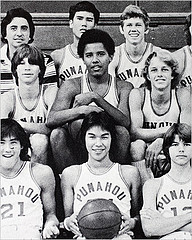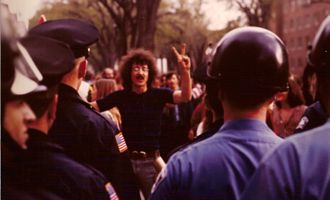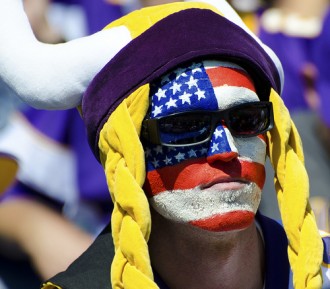
In response to the sport and politics white paper Kyle Green and I recently wrote for this site, ThickCulture writer and loyal friend of TSP Andrew Linder emailed to suggest that although Barack Obama is obviously not the first “sports president,” he may be the first “ESPN President” or “SportsCenter President.” Andrew’s point (now up on ThickCulture as a more fleshed out post—jinx!) was that, although ESPN had become a cultural fixture under Bill Clinton and George W. Bush, Obama represented the core network demographic in its first two decades of its existence and it seems to have been formative for him. To the extent that ESPN has transformed sporting culture, then, Obama is the first President to be fully fashioned in and through that new culture.
This seemed plausible enough—and was definitely borne out in a recent interview the President gave to the star sportswriter/reporter Bill Simmons. At least two things about the interview should be pointed out. The first is why Obama chose this particular venue and reporter: “Simmons,” as one report put it, “is revered by the under-30 crowd” and “has more than 1 million—1,642, 522 to be exact—Twitter followers.” Indeed, his “B.S. Report” podcast, on which the Obama interview originally appeared, is said to be one of the most downloaded podcasts on the web. The second point is how this interview and exchange reveals what a great fan of sports and sports talk our President actually is.
Not only is his obsession with ESPN’s SportsCenter evident, Obama shows himself to be an extremely knowledgeable sports fan, gifted in the arts of sports talk and debate. Talking with Simmons, the President riffs on Linsanity (claiming to have been on the bandwagon early) and the joys and challenges of coaching his daughters, argues about the best NBA teams and players of all time (MJ and the Bulls figure prominently), revisits his vision for a college football playoff, and waxes poetic about his philosophies on sportsmanship and scoring in golf. Obama even brags a bit about the “solid” crossover move he threw on NBA All-Star point guard Chris Paul in a summer scrimmage. All this is to say, Obama doesn’t just talk about sports, he’s really talking sports.
Entertaining (and impressive) as I found all of this, I was even more intrigued by a follow-up Washington Post post that explained why the President would take time out of his unbelievably busy schedule to do this interview (as well as other sports related activities such as his sit-down with Matt Lauer during the Superbowl pre-game show in February or his annual NCAA/march madness picks). “Sports,” according to the WSJ, “is a universal language that can bridge ideological, cultural, and socio-economic gaps …you are much more inclined to like people who share that fandom regardless of whether you have anything else in common with them. You feel some sort of connection to them. They speak your (sports) language.”
The piece goes on to speculate that sport may be particularly a particularly important medium (and media outlet) for Obama “whose background—biracial parents, childhood in Hawaii, Harvard Law School, etc.—is somewhat unfamiliar to many of the voters he needs to convince to back him if he wants to win a second term in November.” While talking with sportswriters “isn’t going to convince on-the-fence voters that Obama is one of them,” the writer says, we shouldn’t “forget the connective power that sports holds in the world of politics.” The article concludes: “Obama’s ability to speak the language of sports is a major political plus for him.”

 The Society Pages’ wondrous Monte Bute (that’s him, above, flashing the peace sign to the police) was picked by one MPR reporter as his favorite story/interview of the year, and so the reporter has published a quick update from the land-of-Bute:
The Society Pages’ wondrous Monte Bute (that’s him, above, flashing the peace sign to the police) was picked by one MPR reporter as his favorite story/interview of the year, and so the reporter has published a quick update from the land-of-Bute: 